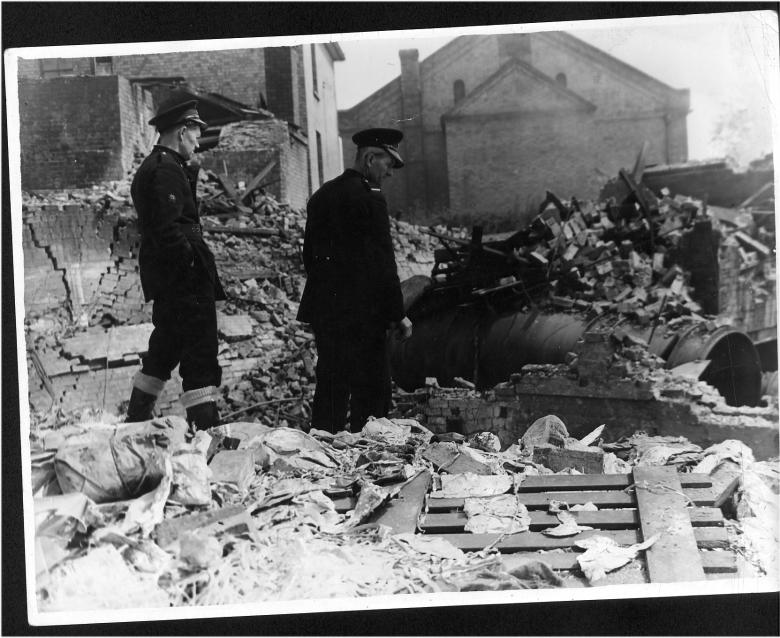
Whilst speaking to Miss Drake during her recent visit to Shropshire to discuss her father’s time at Shropshire Fire and Rescue Service, she mentioned an incident in Ironbridge. She recalls. “I was very aware of the impact a serious fire can have on the entire family and the loved ones of a fire-fighter. I was never told anything, I could just sense something was wrong.”
After the enormous efforts of Miss Drake’s research and Miss Smith (from the Ironbridge museum trust), I can finally publish the story for you all to read. This incident has been covered throughout the years in the Shropshire Star who have kindly also forwarded some images.
Just two years into it’s new established state Shropshire Fire Brigade experienced its first major incident.
An explosion and fire in Ironbridge made national headlines. The tragedy which left two dead and seven firemen and three employees injured was such a big story that a helicopter flew overhead, which was virtually unknown in those days. The blaze was at the Ironbridge Metal Company half way up Madeley Hill, where businessman Ferdinand Frankel was managing director of a firm recovering the metal from aluminium foil. Events were to show that this was a process fraught with danger.
On the 12th of May 1950 fire-fighters were fighting a fire in the furnace room when there was a terrific explosion, which buried three of them under the debris. It could be heard miles away and shattered windows in nearby homes. Rescuers toiled at the scene to dig out those trapped under fallen masonry, but Bavarian-born Mr Frankel and employee Kate Healey, had been killed. A peculiar difficulty in fighting the fire, which was to burn for a week, was that the aluminium fragments appear to have had some of the qualities of an incendiary bomb and reacted in a volatile manner to water.
A former fireman has told how he was buried under rubble when he was caught in a the huge explosion.
Fred Ward was injured in the blast, and it was only after a pioneering campaign fought against strong opposition that he and his injured colleagues received compensation.
Mr Ward, was a part-time fireman serving in Oakengates fire service when he was called out to what was initially only a small fire.
“Myself and another fireman from the Oakengates brigade, Bill Merrington, were inside the building when it blew up. We were buried. I was hospitalised and lost my index finger and the use of my thumb, and Mr Merrington lost his right arm and left hand.
“The man in charge, A.D.O. Pow had sent for a load of sand because we could not extinguish the fire with the foam. While we were waiting for this sand to be delivered we were told to stay in the building to keep the ignition temperature down”.
“We had been in the building for about 20 minutes, and then there was this big explosion. I felt as if I was being thrown against a brick wall, which obviously I was. I was buried for about 20 minutes to half an hour. I remember that while I was under the debris the water from the ruptured hose was filling up the cavity I was in, and it was around my face. I felt some of the brickwork fall across the back of my neck and I called out for help. If that had not have happened I don’t think I would be here now. That was when they started digging me out.”
Mr Ward lost his index finger and suffered injuries which required skin grafts, he had to end his job as a toolmaker at GKN Sankey because his injuries meant he could no longer use precision instruments.
It seems that Bill Merrington who lost his right arm and left hand in the explosion was to make history as he fought his compensation claim, that paved the way part-time firemen were treated in fire brigades across the country. The most important being the way that the part-time fire-fighters were trained. During the inquest Mr Merrington stated that as a retained fireman he did not have any specialist training and was never taught anything about explosive risks from aluminium. “I feel the greatest of respects for these gentlemen of other occupations who take on this work for an almost nominal retaining fee” said Mr Justice Hallett. “ It is an admirable form of service, but one must remember that in a sense they are amateurs – patriotic amateurs”.
After a nine day legal battle at Shrewsbury Assizes in July 1952 Mr Justice Hallett decided that the explosion was caused through the negligence of the Metal Company owning the factory and the deceased managing director. Mr Merrington received £15,000 damages. The precedent set by this case was quickly followed in other parts of the country which resulted in injured firemen in other fire brigades recovering damages from negligent owners or occupiers.
For More Photos of this incident please follow this link to the SFRS History Blog Page https://sfrshistory.wordpress.com/2013/11/23/the-ironbridge-metal-works-disaster/




